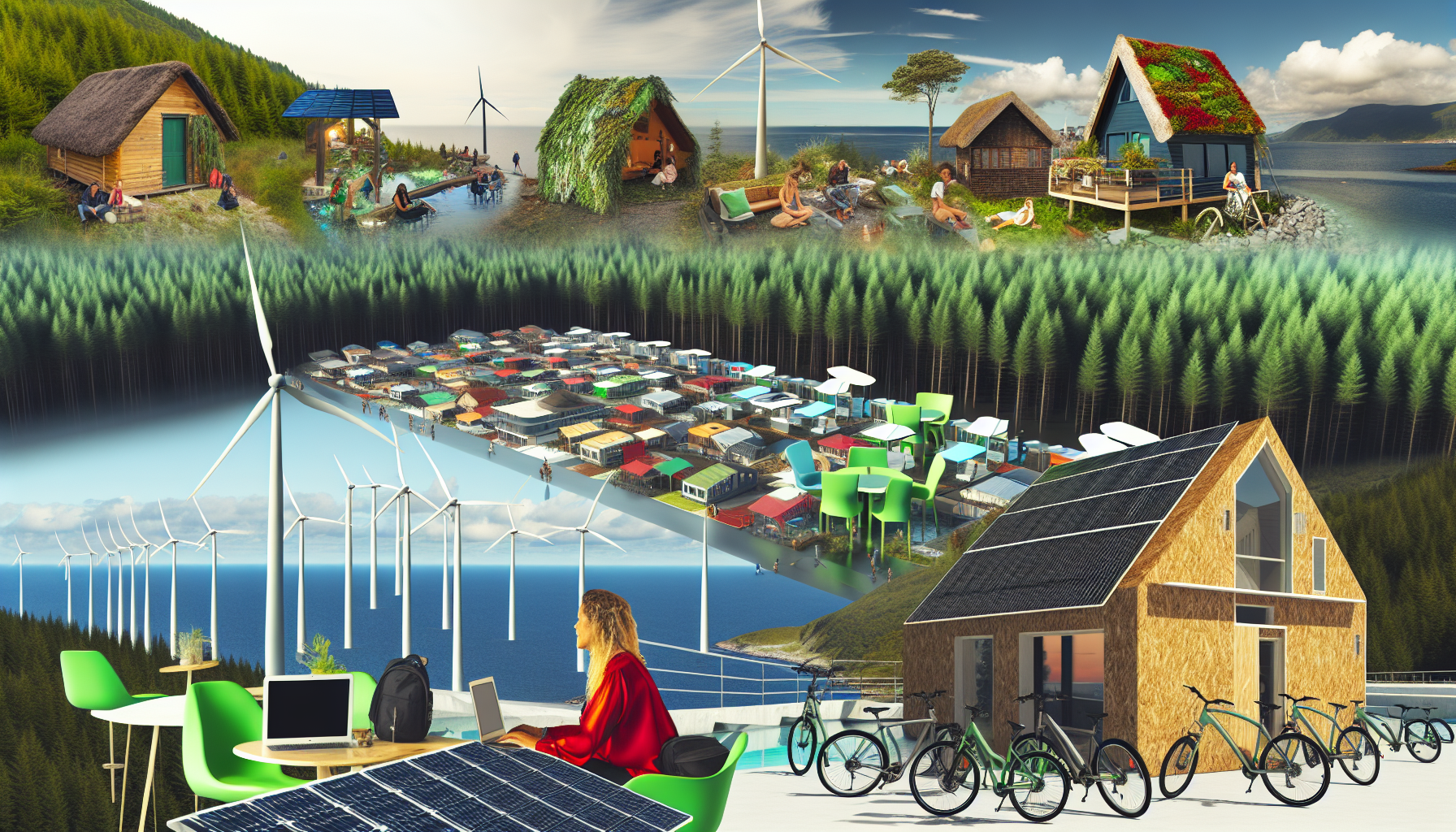The Most Eco-Friendly Destinations for Digital Nomads
Imagine a life where your workspace is a serene beach or a lush forest, where your daily routine includes conscious efforts to reduce your carbon footprint, and your travel destinations contribute too. Enter the world of the eco-friendly digital nomad. As the globe becomes more connected, the emphasis on sustainable living has never been more vital, and it’s fascinating to see where green-minded wanderers can harmonize work with nature. This blog is your passport to discovering the most eco-friendly destinations for digital nomads.
Key Takeaways
- Discover destinations prioritizing sustainability and eco-friendliness.
- Learn about the technological infrastructure of green cities.
- Find out about local initiatives promoting sustainable living.
- Get practical tips for an eco-friendly nomadic lifestyle.
- Compare eco-friendly destinations based on emissions, green spaces, and public transportation.
Costa Rica: A Green Paradise
Reforestation and Biodiversity
Costa Rica is a haven for those who cherish nature. With its immense biodiversity and extensive reforestation projects, this small Central American country leads the way in terms of environmental initiatives. The government has invested heavily in renewable energy, achieving near 100% renewable electricity for several years.
“Costa Rica’s commitment to sustainability is unparalleled. It’s not just a destination; it’s a movement,” says Linda Garcia, an environmental scientist and digital nomad.
Colossal Connectivity
Despite its dedication to green living, Costa Rica doesn’t compromise on connectivity. Wi-Fi is abundant, particularly in San José and Expats’ favorite towns like Tamarindo and Santa Teresa.
Local Initiatives
Expect plenty of eco-friendly accommodations and organic eateries. Take part in community cleanups or conservation efforts for an enriching experience.
Norway: The Sustainable Tech Hub
Renewable Revolution
Norway stands tall in the list thanks to its successful renewable energy sector, predominantly hydropower. It’s rich in resources and brimming with green cities like Oslo, which even won the European Green Capital award.
Digital Infrastructure
With one of the fastest internet speeds globally and state-of-the-art facilities, Norway is a tech-savvy digital nomad’s dream. Remote workers can enjoy co-working spaces in eco-conscious cities such as Bergen and Trondheim.
Slovenia: Green Elegance of Europe
Eco-Credentials
Slovenia, particularly its capital Ljubljana, is an epitome of green living. Ljubljana was named the European Green Capital in 2016 for its exceptional dedication to environmental preservation, waste management, and green policies.
Connectivity and Comfort
The city offers excellent internet services, plenty of co-working hubs, and a relaxed atmosphere for digital nomads.
Community and Culture
Eco-friendly activities such as cycling tours, organic farmers’ markets, and superb public transportation make Slovenia a standout.
Local Perspective
“Ljubljana is not just beautiful; it’s a testament to how urban life and nature can coexist harmoniously,” shares Marta Novak, an eco-travel blogger and nomad.
New Zealand: Pure Adventure and Sustainability
100% Pure Campaign
Known as the adventure capital of the world, New Zealand is also leading in sustainability efforts. Initiatives such as the ‘100% Pure’ campaign highlight the country’s commitment to preserving its stunning landscapes.
Connectivity
Major cities like Auckland and Wellington offer superior internet connectivity and modern amenities for remote work.
Living Green
Choose eco-lodges and sustainable Airbnbs, or join local sustainability projects for a holistic experience.
Japan: Eco-Innovation Meets Tradition
Renewables and Recycling
Japan is not typically known for being eco-friendly, but cities like Kyoto and Fukuoka are changing that perception with their innovative waste management and renewable energy initiatives.
Digital Infrastructure
Exceptionally high internet speeds and cutting-edge technology make working remotely effortlessly.
Sustainable Lifestyle
Opt for accommodations in traditional Ryokan inns that practice sustainable living, and contribute to local recycling efforts and green initiatives.
Eco-Friendly Destinations Comparison
| Destination | Emissions (tons CO2 per capita) | Green Spaces (sq km per capita) | Public Transportation Quality |
|---|---|---|---|
| Costa Rica | 1.89 | 0.25 | Moderate |
| Norway | 8.3 | 0.50 | Excellent |
| Slovenia | 6.4 | 0.35 | Good |
| New Zealand | 7.7 | 0.45 | Moderate |
| Japan (Kyoto) | 9.0 | 0.30 | Excellent |
Living or Experiential Tips
- Pack Reusables: Opt for reusable water bottles, shopping bags, and utensils to minimize waste.
- Public Transport and Bikes: Use public transport or rent bicycles. Avoid taxis and rented cars to reduce emissions.
- Stay in Green Accommodations: Choose eco-friendly hotels or hostels that prioritize sustainability.
- Local Markets: Frequent local farmers’ markets for organic produce instead of supermarkets.
- Digital Detox Days: Plan days without screen time to immerse yourself in nature.
Summoning the spirit of digital nomads across the globe, the passion for sustainability and adventure knows no bounds. By choosing eco-friendly destinations, you don’t just work; you make a difference. The places like Costa Rica, Norway, Slovenia, New Zealand, and Kyoto in Japan offer splendid internet connectivity, rich culture, and a green lifestyle that lets you leave a lighter footprint on our beautiful planet. Dive deeper into this harmonious way of living and discover an extraordinary blend of technology and nature.
Sources:
FAQ
What makes a destination eco-friendly?
Eco-friendly destinations emphasize sustainable practices such as renewable energy, low emissions, excellent public transportation, efficient waste management, and a plethora of green spaces.
How can I ensure my travels are environmentally friendly?
Limit air travel, opt for trains or buses instead. Use digital means to work remotely and avoid unnecessary travel. Stay in sustainable accommodations and support local eco-initiatives.
Which is the most eco-friendly destination for a digital nomad in terms of internet speed?
Norway is known for its high-speed internet and superior tech facilities, making it an ideal destination for digital nomads who don’t want to compromise on connectivity.
